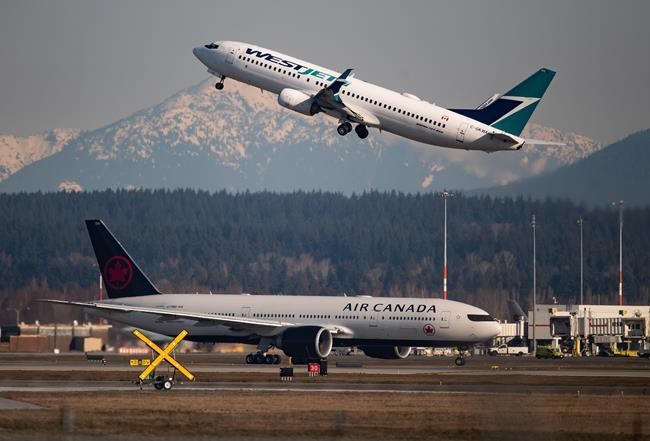CALGARY — A consumer advocate says two recent regulatory rulings ordering Canadian airlines to compensate passengers for flight disruptions won't be enough to improve air travel in this country.
In an interview, Gábor Lukács — founder of the advocacy group Air Passenger Rights — said the separate decisions this summer by the Canadian Transportation Agency (CTA) in favour of passengers who had flights cancelled due to crew shortages only serve to paper over the complaints of thousands of Canadians who have suffered through airport backlogs and flight delays in the past year.
"These two rulings are isolated and exceptional incidents of the CTA doing what it is supposed to do," Lukács said.
"These two decisions (serve as) helpful case law for passengers who take airlines to small claims court instead of wasting months or years waiting for the CTA. They offer no meaningful remedy to passengers who put their hope in the CTA, though."
In August, the CTA — a quasi-judicial tribunal — ordered Air Canada to pay $1,000 each to Lisa Crawford and her son, who had their August 2021 flights from Fort St. John, B.C. to Halifax delayed by 16 hours.
Earlier in the summer, the CTA also ordered WestJet to pay $1,000 to a passenger whose cancelled flight from Ottawa in July 2021 meant he arrived at his destination in Regina, Sask. 21 hours later than scheduled.
In both decisions, the CTA ruled that staffing shortages are the responsibility of the airline, and not a safety issue as the airlines had argued. Under Canada's Air Passenger Protection Regulations, airlines only have to compensate passengers for delayed and cancelled flights if the reason for the disruption is within the airline's control.
WestJet has filed a notice of motion indicating its intent to appeal the decision, while Air Canada has said it is still reviewing the CTA ruling. Both airlines declined to comment further on the matter.
But Lukács said the CTA currently has a backlog of thousands of complaints by Canadians affected by pandemic-era flight cancellations and delays. He said while compensation is one thing, what the CTA should really be doing is imposing stiff monetary penalties on airlines for failing to comply with Canada's air passenger protection legislation.
The federal transportation regulator unveiled the original Air Passenger Protection Regulations in 2019, outlining how airlines must communicate and reimburse or compensate travellers for everything from delayed flights to damaged luggage. There were exemptions, however, for delays and cancellations outside of the airline's control such as major weather events — or a pandemic.
Updated guidelines introduced earlier this month are an attempt by the federal government to close a loophole that left some passengers unable to secure cash refunds after pandemic-related flight delays and cancellations. Now, airlines will be required to issue a full refund for cancellations and delays if passengers are not placed on a new flight within 48 hours, including for reasons outside of the airline's control.
"These new requirements provide clarity around timing, cost coverage, method of payment, and deadlines to refund travellers in such situations," said federal Transport Minister Omar Alghabra in a release.
"They were developed in a manner that is fair and reasonable to passengers, with the goal of not imposing an undue financial burden on air carriers that could result in higher travel costs."
Air Canada and Porter Airlines Inc., along with 17 other applicants that include the International Air Transport Association — which has some 290 member airlines — stated in a court filing that the required payments under the country’s new air passenger bill of rights violate international standards and should be rendered invalid.
This report by The Canadian Press was first published Sept. 16, 2022.
Companies in this story: (TSX:AC)
Amanda Stephenson, The Canadian Press



